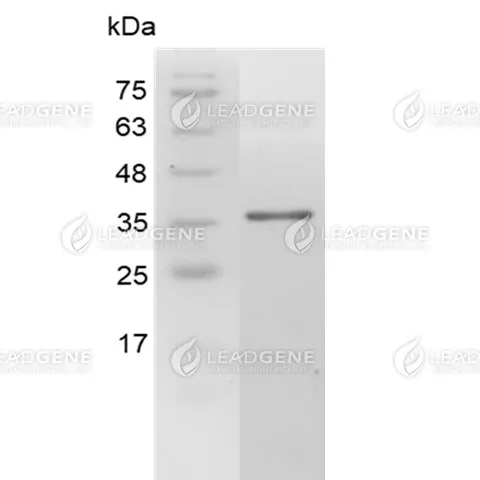-
Species of Origin
Human
Expression system
Escherichia coli
-
Affinity Tag
His Tag (N-term)
Buffer
Lyophilized from a 0.2 µm filtered solution of PBS, pH 7.4.
-
Purity
>98% as determined by SDS-PAGE analysis.
Molecular weight
The protein has a calculated MW of 36.8 kDa.
The protein migrates as 37 kDa under reducing condition (SDS-PAGE analysis). -
Activity
Measure by its ability to chemoattract human THP1 cells using a concentration range of 0.5-2.5 µg/mL.
Endotoxin level
<0.1 EU per 1 μg of the protein by the LAL method.
-
Form
Lyophilized
-
Specifications
-
Background
-
Background
Galectin-4 (Gal-4) is a lectin family member and is one of the tandem repeat-type galectins containing two carbohydrate recognition domains (CRD) connected by a linker region in a single peptide chain. The CRD is responsible for β-galactoside binding, and several binding partners for galectin-4 have been identified, including human blood group antigens, glycoproteins, mucin like membrane MUC1, glycosphingolipids, and sulfated cholesterol. Galectin-4 is constitutively presented in the intestine and stomach, uterine epithelial cells, blood vessel walls, hippocampal and cortical neurons. It serves important functions in numerous biological activities including lipid raft stabilization, protein apical trafficking, cell adhesion, wound healing, intestinal inflammation, and host defense.
Synonyms
Gal-4, Antigen NY-CO-27, L-36 lactose-binding protein, L36LBP, Lactose-binding lectin 4
-
Uniprot ID
#P56470
Sequence Note
Ala2-Ile323
-
-
Instruction
-
Reconstitution
It is recommended to reconstitute the lyophilized protein in sterile H₂O to a concentration of 200 μg/mL and incubate the stock solution for at least 20 min to ensure sufficient re-dissolved.
Shipping
The product is shipped with polar packs. Upon receipt, store it immediately at -20°C or lower for long term storage.
-
Stability & Storage
This product is stable after storage at:
- -20°C for 12 months in lyophilized state from date of receipt.
- -20°C or -80°C for 1 month under sterile conditions after reconstitution.
Avoid repeated freeze/thaw cycles.
-
-
Image
1/1 -
Review

Help others learn more about this product. Use the link below to share your experience.
-
Publication

There are currently no publications. Use the link below to let us know.
-
Datasheet & Documents
1/1
Disclaimer:For Research Use or Further Manufacturing Only.

